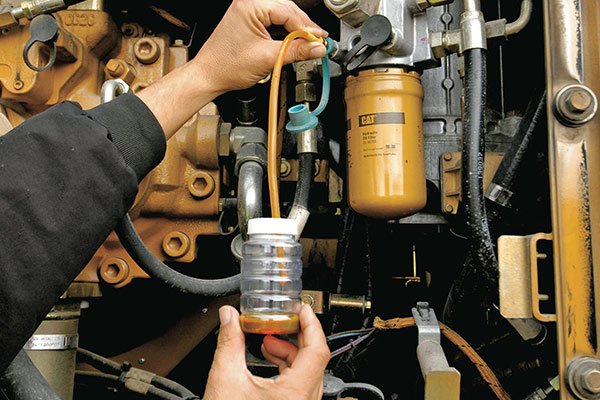
All News >> Digital Newsletters
Oil Sampling Do’s and Don’ts
March 1, 2021
Written By Zach Studer
Regularly sampling your used motor oil for analysis is a great way to extend the life of your equipment. Oil analysis is like getting “bloodwork” for your machines. It provides valuable information about what’s going on inside the equipment that can be used to identify proper drain intervals and potential issues before they lead to costly, catastrophic failures.
However, oil analysis results are only as good as the quality of the sample. Knowing when and how to collect a sample from your equipment correctly will ensure the results accurately depict what’s going on at the microscopic level. The following Do’s and Don’ts for oil sampling can help you eliminate common mistakes and get the most out of your oil analysis program.
Do – Sample from running or warm machines.
The goal of oil analysis is to take a snapshot of the lubricant under normal operating conditions. When your equipment is not running, the lubricants inside stagnate, allowing any suspended materials to settle to the bottom. These materials need to be circulating, or your sample may fail to identify any contaminants in the system and where they came from. When possible, collect lubricant samples from a system that is in operation and has been running for at least 30 minutes. Samples from a warm machine provide a fair representation of the entire lubricant system.
Do – Collect samples upstream from filters and downstream from monitored components.
Filters remove foreign materials and wear particles from lubricants. If your sample collection point is immediately downstream from a filter, you may not see revelatory wear metals in your oil analysis report because the filter removed them.
Don’t – Collect samples from drain plugs.
Sediment naturally collects in high concentrations near equipment drain plugs, which are located at the lowest point in the system. Due to these high sediment concentrations, sampling from drain plugs does not provide you with a fair representation of the entire system. If this is your only option, you should clean the drain plug and surrounding area thoroughly to prevent any foreign material from contaminating the sample. Next, remove the drain plug, let the lubricant flow for several seconds, and then place the oil sample container into the draining lubricant flow, catching it mid-stream. If possible, use oil sample ports or a pump to extract a sample from a dip-stick tube and never reuse tubing.
Do – Sample at regular intervals, not just when it’s convenient.
Oil analysis works best when the analyzed data provides monitorable trends. This is why you need to establish a baseline to know what is normal and what’s not. The old saying, ‘You can’t know where you are going until you know where you have been’ holds true with oil analysis. Most machinery manufacturers will recommend sampling intervals. Whether it’s every 500 hours, every 10,000 miles, monthly, quarterly, or yearly, it’s essential to stick to the regimen.
Don’t – Let untrained personnel collect samples.
If two different people collect samples from the same unit, chances are you will get samples collected two different ways. It’s best practice to create a written procedure for sample collection and, whenever possible, assign one individual to manage the process to reduce variability. Samples should be collected from the same location on the equipment under the same conditions each time.
Do – Fill out all the appropriate paperwork.
One of the most common errors people make is going through all the effort to properly collect a sample and forgetting to fill out vital information on the paperwork before sending the sample to the lab. Always double check ALL the information has been filled out before shipping your sample.
Don’t – Forget to send your sample ASAP.
Once you have your sample and the paperwork is complete, don’t toss it in the back seat of your truck, where it can get lost or forgotten for weeks or months. Mail it ASAP. If there is a problem with your equipment, you will want to know sooner rather than later. Prompt analysis can give you time to act before costly repairs or unplanned downtime occur.
Do – Ask questions.
Once the MFA Oil Laboratory receives and analyzes your sample, the findings will be emailed back to you (if your email was provided) and your local MFA Oil bulk plant. Results are typically available within 24 to 48 hours. Every analysis includes a section called “Understanding Your Report” that explains the findings of your analysis. If you have any questions about the report or if you need assistance interpreting the results, please contact your local MFA Oil representative or the lab for help. To reach the lab, call 1-800-MFA-LUBE or email [email protected].
Fuel and oil sample collection kits are available at all local MFA Oil bulk fuel locations.

